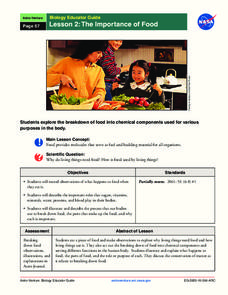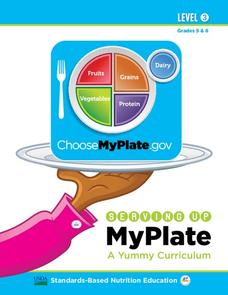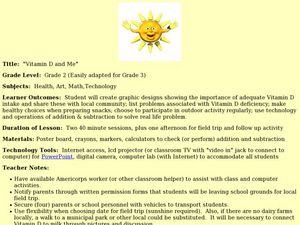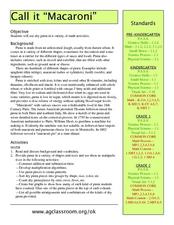NASA
The Importance of Food
Pupils make observations while eating food. They act out the process of food breaking down in the body and the roles of various chemical components, such as sugar and protein. It concludes with an activity illustrating the process and a...
Curated OER
It's All About Vitamins
The fascinating topic of human skin color is examined in this article from Muse magazine. It highlights a study done by a pair of scientists on the relationships among strength of sunlight, vitamins, and melanin in the skin. The results...
Curated OER
Basic Vitamins: Water-Soluble and Fat-Soluble
An incredibly thorough lesson on vitamins, and how to keep one's body at peak health. Learners access a variety of excellent worksheets embedded in the plan that have them consider raw vs. cooked foods, a vegetable nutrition summary,...
Curated OER
Souper Art
Turn your young artists into great marketing specialists with this fun lesson plan! They will turn ordinary soup cans into exciting choices for dinner by recreating the can label. This is a fantastic project to connect art, advertising,...
Curated OER
Lab Experiments in Nutrition
Looking for authentic hands-on nutritional experiments? High schoolers will perform experiments to test for the presence of vitamin C in several solutions as well as the effect of caffeine on Daphnia. They will also consider the...
Nemours KidsHealth
Healthy Snacking: Grades 9-12
Snacks—even the word can conger up a hunger. Rapidly growing teens, especially, rely on snacks to get them from one meal to the next. After reading a series of articles about nutrition and healthy snack choices, pupils fill out a report...
Nemours KidsHealth
Food Labels: Grades 9-12
Check the label! That's the big idea in a instructional activity about using the nutrition facts on food labels rather than advertising hype to make healthy choices about what to eat. After reading background articles and learning how to...
Serendip
Genetic Engineering Challenge – How Can Scientists Develop a Type of Rice That Could Prevent Vitamin A Deficiency?
Brown rice contains vitamins B and E, while white rice lasts longer in storage. The availability of rice around the world makes it a great candidate for genetic engineering. Scholars apply their knowledge of genetic engineering to solve...
Serendip
Golden Rice – Evaluating the Pros and Cons
More than half the world's population eats rice as a daily staple ... imagine if that rice could prevent illness. Scientists genetically engineered rice to include vitamin A for just that purpose. However, room for debate still exists....
Serendip
Vitamins and Health – Why Experts Disagree
Should people take vitamins or get the needed minerals through diet? Experts disagree based on many different factors. Scholars compare study findings and discuss the differences. They learn the importance of comparing results across...
Howard Hughes Medical Institute
Molecular Structure of Fat
Bad fat, good fat, trans fat, food fat—are all fats created equal? Get to the bottom of the types of fat with a well-crafted presentation. The resource covers adipose tissue, lipids, trans fats, and many other substances that fall under...
Nuffield Foundation
Measuring the Vitamin C Content of Foods and Fruit Juices
Are you getting enough vitamin C? Young scientists determine the amount of vitamin C in fruit juice samples. They accomplish this task by adding DCPIP solution to the samples until the blue color of the DCPIP persists. Once this happens,...
Cornell University
Vitamin C Module
Test the levels of vitamin C in different juices. After a lesson on the importance of vitamin C in our diets, learners use titration to determine the vitamin C content in juice. They use their experience with the titration to study the...
Curated OER
Uncovering Underground Veggies
Add a word puzzle to your underground vegetable lesson plan. Learners unscramble vegetable names and discover a hidden message using corresponding numbers and letters.
US Department of Agriculture
Serving Up My Plate
Within three nutrition-themed, inquiry-based learning opportunities, pupils take notice of their eating habits; delve deep into the five food groups, gain experience in planning meals, participate in a taste test, and explore ads...
Curated OER
An Introduction to Nutrition
Whether you need a new textbook for your health class, or a few exercises and passages for your lesson on nutrition, you'll find what you need with a thorough nutritional science resource. With 15 chapters that cover elements of...
Pomegranate Apps
Foodle - Nutrition Facts
USDA National Nutrient data is available at your fingertips! This application is a vast library of more than 8,000 nutritional labels for commonly eaten foods. Search and sort foods by a variety of categories.
Curated OER
Vitamin D and Me
Students create a graphic organizer showing the importance of Vitamin D intake. In this Vitamin D lesson plan, Students list problems with Vitamin D deficiency and create poster boards in small groups. Individually, students will create...
Curated OER
Call it "Macaroni"
Who knew there were so many fun educational opportunities featuring pasta? Scholars read a brief informational text about the history of pasta (note that "macaroni" is spelled two different ways, so address this if kids are reading...
Curated OER
Food And Energy
The different nutrients needed by the body and the reasons for each are presented very clearly in this powerpoint. There are 2 review questions at the end, but this PowerPoint is essentially comprised of facts and examples to...
Curated OER
The Root Show
Students investigate plant roots. In this plant lesson, students discover the function and structure of plant roots. Students plant a plant in a milk carton with a clear section cut out in order to observe the roots of the plant.
Curated OER
Healthy Eating: Vitamins
The first five slides contain photographs of foods containing each of the major vitamins: A, B, C, D, and E. Then there is a slide explaining each of the three macro nutrients. The final slide is a low-quality graphic of the food...
Curated OER
Nutrients for Plants and People: Reading Food Labels for Nutrition
Apply work with the food pyramid with this worksheet. Have your class go through their cupboards at home and find 5 different foods to inspect. On this handout, they record the food, what part of the food pyramid this food fits into, and...
Curated OER
Nutrition: How Much Fat Am I Eating?
How much fat is in this? Scholars first read some background information on the caloric content of fats versus carbohydrates, and then use that knowledge to analyze foods they regularly eat. They will look at 5 package labels for the...

























